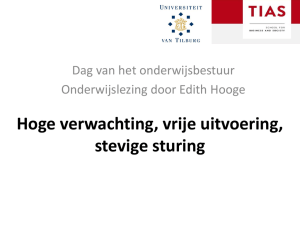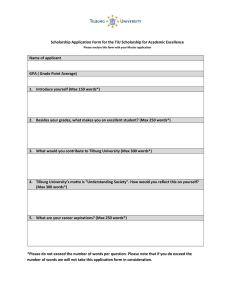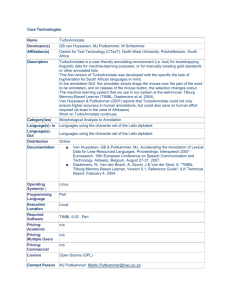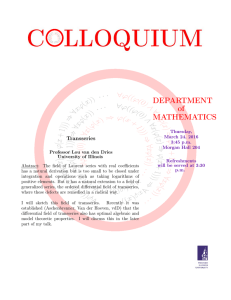Private Law and Globalization: Theory and Practice
advertisement
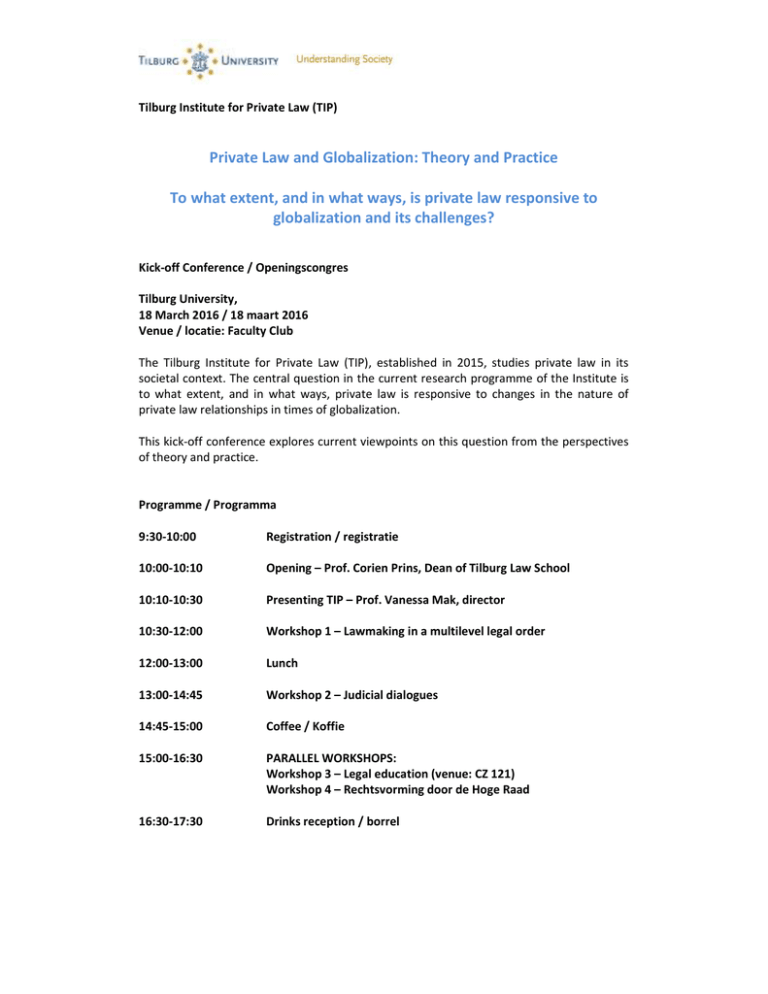
Tilburg Institute for Private Law (TIP) Private Law and Globalization: Theory and Practice To what extent, and in what ways, is private law responsive to globalization and its challenges? Kick-off Conference / Openingscongres Tilburg University, 18 March 2016 / 18 maart 2016 Venue / locatie: Faculty Club The Tilburg Institute for Private Law (TIP), established in 2015, studies private law in its societal context. The central question in the current research programme of the Institute is to what extent, and in what ways, private law is responsive to changes in the nature of private law relationships in times of globalization. This kick-off conference explores current viewpoints on this question from the perspectives of theory and practice. Programme / Programma 9:30-10:00 Registration / registratie 10:00-10:10 Opening – Prof. Corien Prins, Dean of Tilburg Law School 10:10-10:30 Presenting TIP – Prof. Vanessa Mak, director 10:30-12:00 Workshop 1 – Lawmaking in a multilevel legal order 12:00-13:00 Lunch 13:00-14:45 Workshop 2 – Judicial dialogues 14:45-15:00 Coffee / Koffie 15:00-16:30 PARALLEL WORKSHOPS: Workshop 3 – Legal education (venue: CZ 121) Workshop 4 – Rechtsvorming door de Hoge Raad 16:30-17:30 Drinks reception / borrel WORKSHOPS In four workshops, we discuss the responsiveness of private law in relation to the following themes: Workshop 1 - Lawmaking in a multilevel legal order Chair: Prof. Vanessa Mak (Tilburg) ‘Who does what at what level of regulation?’ is the question that perhaps best captures the discussion in this area. The initial focus of research on cross-border private law transactions was on how private law could best facilitate international contracting. That question is still important, but it has also been recognized that private law might have a role in securing the protection of weaker parties in the transnational market place (e.g. consumers or small businesses). This workshop explores to what extent national, positivist private law is able to respond to the challenges of the global market, and which alternative frameworks for lawmaking might be considered. Specific attention will be paid to the EU’s efforts at harmonization of private laws, most recently in the form of a proposal for a Common European Sales Law (CESL, of which a new version is expected in December 2015). Speakers: Prof. Christoph Busch (Osnabrück) Dr. Rafał Mańko (European Parliamentary Research Service) Workshop 2 - Judicial dialogues Chair: Prof. Marc Loth (Tilburg) The centre of judicial lawmaking has shifted from the case law of highest national courts to the dialogues between those courts and the supra-national courts, the ECJ and the ECtHR in particular. This simple observation raises several questions of great complexity, both of judicial and academic relevance. For practitioners and judges, the question is how to influence and conduct those dialogues. For academics, the problem is how to make sense of the process of judicial lawmaking through dialogues between different courts. All of them are puzzled by the relations between the courts involved, and the facilitators and the obstacles for constructive cooperation in the judicial domain. Speakers: Justice Jos Silvis (European Court of Human Rights) Justice Marko Ilešič (Court of Justice of the EU) PARALLEL WORKSHOPS 3 AND 4: Workshop 3 - Legal education Chair: Prof. Eric Tjong Tjin Tai (Tilburg) Legal education in the last century has usually concentrated on one national jurisdiction that the students need to master. The recognition of the European multilevel legal order, and the general global developments in regulation have however modified the demands made on lawyers in practice. The question is whether legal education should keep up with these demands, and in what way. Is it possible and desirable to teach the law from a non-national perspective? One might argue that thinking like a lawyer implies the ability to find arguments and know limitations within a complete legal system, which seems to preclude a purely comparative education that cherry picks isolated doctrines. On the other hand there are earlier experiences in teaching the law on a not directly positive legal basis such as the ius commune or the US Uniform Commercial Code. In this workshop practitioners and lecturers will debate, and aim at clarifying the issues and possibilities for global legal education. Speakers: Prof. Martijn Scheltema (Rotterdam / Pels Rijcken, The Hague) Dr. Bram Akkermans (Maastricht) Dr. Melanie van den Berg (Achmea) Workshop 4 – Rechtsvorming door de Hoge Raad Voorzitter: Prof.mr. Jan Vranken emeritus hoogleraar privaatrecht, Universiteit van Tilburg en oud-advocaat generaal Hoge Raad der Nederlanden In deze workshop staat de wijze waarop de Hoge Raad zijn rechtsvormende taak op het terrein van het privaatrecht uitoefent centraal. Uitgangspunt daarbij is het artikel van mr. Floris Bakels: 'Totstandkoming en uitleg van uitspraken van de Hoge Raad' (Ars Aequi december 2015) dat door mr. Bakels kort nader zal worden toegelicht. Reinout Wibier zal vervolgens ingaan op de wijze waarop de Hoge Raad zijn rechtsvormende rol heeft ingevuld bij de problematiek van contractuele onoverdraagbaarheidsbedingen (HR 17 januari 2003, NJ 2004, 281 m.nt. H.J. Snijders (Oryx/Van Eesteren) en HR 21 maart 2014, NJ 2015, 167 m.nt. H.J. Snijders (Coface Finanz/Intergamma). Stéphanie van Gulijk bespreekt de rechtsvormende taak van de Hoge Raad ten aanzien van het leerstuk contract en derde, bezien vanuit de reikwijdte van het relativiteitsbeginsel. Zij doet dit met name aan de hand van een analyse van het Eneco Tour arrest (HR 14 juli 2014, NJ 2015, 2 m.nt. T.F.E. Tjong Tjin Tai). Na deze drie inleidingen zal er ruimschoots gelegenheid zijn voor een discussie met de aanwezigen aan de hand van een aantal stellingen. Sprekers: mr. Floris Bakels, vice-president Hoge Raad der Nederlanden prof.mr. Reinout Wibier, hoogleraar privaatrecht, Universiteit van Tilburg mw. mr. dr. S. van Gulijk, universitair hoofddocent privaatrecht, Universiteit van Tilburg
